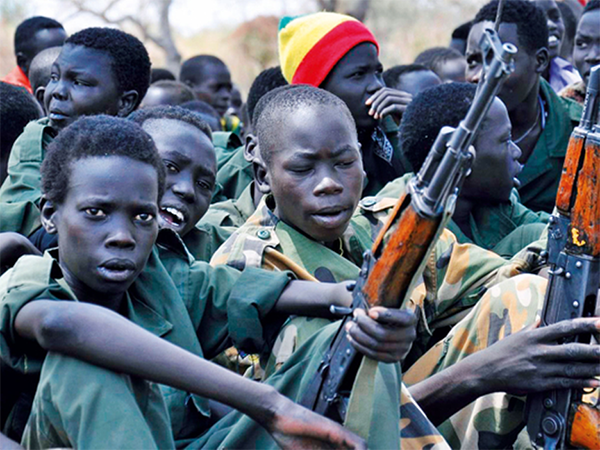The Use of Child Soldiers: Children of Conflict
TRANSCEND MEMBERS, 13 Feb 2023
René Wadlow – TRANSCEND Media Service
12 February is the United Nations sponsored International Day Against the Use of Child Soldiers. Efforts to counter the use of persons under 18 years of age in the military began with non-governmental efforts in 1979 – which the U.N. had proclaimed as “The International Year of the Child”.
Nicolas Hulot, who later became well known in France for his reporting on ecology and the defence of the environment, had written “Ces Enfants qui souffrent” (Paris: Sipa-Press, 1978). He highlighted children dying from malnutrition, disease, and injury caused by wars and natural disasters. Hulot’s cry of conscience showed children fighting and being trained to fight in a number of countries in different parts of the world.
Concern with the welfare of children has been an inter-governmental concern going back to the League of Nations days. However, the use of child soldiers was rarely mentioned as the professional military prior to the Second World War had persons over 18, usually the youngest were in their 20s. However, the German Nazi used very young men in the last days of the war to try to limit the impact of the Allied forces within Germany. There were a number of films and books which told of their efforts. However, attention did not carry on once the Nazi forces were defeated.
Building on the NGO efforts in 1979 during the International Year of the Child, in the period 1993-1996, there was a U.N. study on the “Impact of Armed Conflict on Children” led by Ms Graça Machel, later the wife of Nelson Mandela. She wrote “For too long, the consequences for children have been tolerated as an unfortunate but inevitable side effect of war. In reality, children have increasingly become targets and not incedental victims, as a result of conscious and deliberate decisions made by adults.”
As a result of the Graça Machel study in 1997, the U.N. General Assembly named Ambassador Olara A. Otunnu as Special Representative of the Secretary-General for Children and Armed Conflict. He placed an emphasis on the moral vacuum in which all restraints have been eroded and discarded – a world in which children are no longer precious. He wrote,
“At the heart of this growing phenomenon of mass violence and social disintegration is a crisis of values. Perhaps the most fundamental loss a society can suffer is the collapse of its own value system. Many societies exposed to protracted conflicts have seen their community values radically undermined, if not shattered altogether. This has given rise to an ethical vacuum – a setting in which international standards are ignored with impunity and where local value systems have lost their sway. Distinctions between civilians and combatants have broken down. Children, women, the elderly – all have become fair game in the single-minded struggle for power.”
Ambassador Otunnu was from Uganda which had seen more than its share of the breakdown of social norms and resulting violence such as that carried on by the Lord’s Resistance Army which systematically abducted children to be used as soldiers, porters, and sex slaves starting in 1987 but building on earlier armed movements. He was in exile and given citizenship by the Cote d’Ivoire which had appointed him Ambassador to the U.N. During the sessions of the U.N. Committee on Human Rights, he was in Geneva, and we had long discussions. He was very open to the spirit of Citizens of the World and the need to develop universal norms so as to move beyond an unregulated struggle for power.
Olara Otunnu wrote “Children represent the future of human civilization and the future of every society. To permit them to be used as pawns in warfare, whether as targets or perpetrators, is to cast a shadow on the future. From generation to generation, violence begets violence, as the abused grow up to become abusers. Children who are thus violated carry the scars of fear and hatred in their hearts and minds. Forced to learn to kill instead of pursuing education, the children of conflict lack the knowledge and skills needed to build their futures and the futures of their communities. For a society, the lives destroyed and the opportunities lost could have a devastating effect on its long-term stability and development.
______________________________________
 René Wadlow is a member of the TRANSCEND Network for Peace Development Environment. He is President of the Association of World Citizens, an international peace organization with consultative status with ECOSOC, the United Nations organ facilitating international cooperation and problem-solving in economic and social issues, and editor of Transnational Perspectives.
René Wadlow is a member of the TRANSCEND Network for Peace Development Environment. He is President of the Association of World Citizens, an international peace organization with consultative status with ECOSOC, the United Nations organ facilitating international cooperation and problem-solving in economic and social issues, and editor of Transnational Perspectives.
Tags: Child Soldiers, Child protection, Children, International Day against the Use of Child Soldiers, United Nations
This article originally appeared on Transcend Media Service (TMS) on 13 Feb 2023.
Anticopyright: Editorials and articles originated on TMS may be freely reprinted, disseminated, translated and used as background material, provided an acknowledgement and link to the source, TMS: The Use of Child Soldiers: Children of Conflict, is included. Thank you.
If you enjoyed this article, please donate to TMS to join the growing list of TMS Supporters.

This work is licensed under a CC BY-NC 4.0 License.
